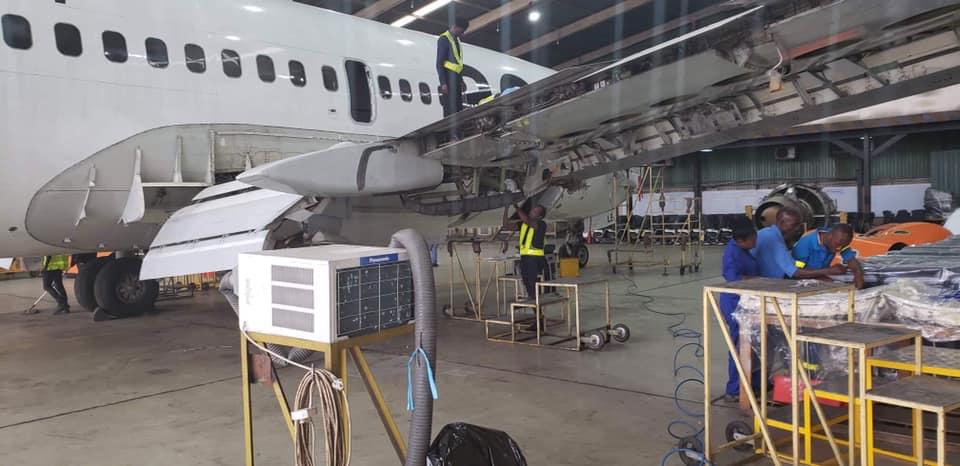
Two years ago Aero received certification for Approved Maintenance Organisation (AMO) from the Nigerian Civil Aviation Authority (NCAA) to conduct C-checks on Boeing B737 Classics, which is the major aircraft fleet for scheduled commercial operation in Nigeria.
Then recently it received another approval from NCAA to conduct D-Check, which is the highest level of maintenance on any aircraft.
What this means is that many Nigerian airlines can now conduct the aircraft maintenance of their fleet in Nigeria and save the huge forex taken overseas to pay for major checks carried out in maintenance facilities overseas.
THISDAY spoke with the CEO of Aero Contractors, Captain Ado Sanusi who explained, “We got approval to do C-check two years ago from NCAA. We have successfully done C-check on our planes and third party (other airlines’ aircraft both local and foreign). NCAA has now given us one time approval to conduct D-check on our airplane, a Boeing B737-500. This is the first on a Boeing B737 Classic.
“We are working with our maintenance partners, South Africa Airways Technic. We can refer to them in the event we need guidance in the structural repairs. We are also working with AJ Walters, which is providing us with parts; in case we need any special tooling.”
Captain Sanusi said that Aero has recruited technical personnel to add to the manpower the company has, including four Ethiopian aircraft engineers, adding that it received approval to conduct D-1 check from NCAA.
On the implication of this progress to Nigeria’s aviation industry, he said that it has created jobs for Nigerians, noting that Aero has employed a lot of Nigerian aircraft engineers who have been sent on training and to understudy other well-established aircraft maintenance organisations, so the country has capable aircraft engineers now.
Sanusi said Aero maintenance facility is growing and with the ability to conduct D-check it means that there would be more patronage from both local and West and Central African airlines, so the company needs bigger maintenance hangar that can accommodate more aircraft at the same time.
He also said that Aero can now do all levels of maintenance in the Boeing 737 Classics, explaining that what it is conducting on its aircraft and what it received approval for is for D 1 checks, which is the first level of D check maintenance after the aircraft has operated for 24,000 flights, disclosing that the highest D check is D2, after the aircraft has operated 48, 000 flights, after which it would be retired.
Sanusi said Aero maintenance would continue to grow, noting that the next target would be to begin to conduct component repairs and component overhauls with approvals from the engine manufacturers and would in future specialise in landing gear overhaul and engine shock with concentration on top case repairs and modular change.
He said that the company is willing to partner with investors and even collaborate with Akwa Ibom government, which is building a maintenance facility in Uyo because it needs to expand its maintenance services to attend to its growing clientele.
“There are so many benefits to our maintenance capabilities. For example, we have been training our local talent and we have exposed them to understudy other similar facilities overseas. We would like to partner with state governments and individuals so we are disposed for talks with investors.
“So far we are covering our cost and making little profit from our maintenance. We are not losing money. We are giving our customers introductory prices so that they will be comfortable with the service. We are helping them to save money, which they would have spent going overseas. It saves our airlines money to conduct their maintenance locally,” Sanusi said.
Many Nigerian airlines have conducted their c-check maintenance at the Aero MRO and almost all the airlines do their A and B checks at the facility.
Industry observers said Nigeria would gain immensely when the company enlarges its hangar and begin to conduct most of the maintenance for Nigerian carriers as it hopes to upgrade and conduct maintenance for New General Boeing fleet and other aircraft types.
Fuel and aircraft maintenance are money guzzlers for Nigerian airlines, as many industry experts believe that more Nigerian carriers would survive if they begin to conduct their aircraft maintenance locally.
THISDAY






